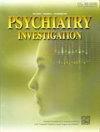抑郁、焦虑和功能失调型睡眠信念介导的癌症患者功能失调型自我关注和对病情恶化的恐惧
IF 1.8
4区 医学
Q3 PSYCHIATRY
引用次数: 0
摘要
目的 本研究探讨了癌症患者的自我关注功能障碍是否是导致其对病情恶化的恐惧的重要因素。方法 我们对 2022 年 3 月至 9 月期间首次到压力管理诊所就诊的 196 名癌症患者的病历进行了回顾性分析。我们收集了他们的人口统计学信息以及对恐惧进展问卷-简表(FoP-Q-SF)、自我关注功能障碍归因量表(DSAS)、患者健康问卷-9项目(PHQ-9)、焦虑状态和特质量表(STAI-S)的状态子类别、失眠严重程度指数(ISI)、癌症相关睡眠功能障碍信念量表(C-DBS)等评分量表以及疼痛和疲劳的数字评分量表的反应。结果 FoP-Q-SF高分与PHQ-9(r=0.60)、STAI-S(r=0.38)、ISI(r=0.34)、C-DBS(r=0.47)、疼痛(r=0.24)、疲劳(r=0.37)和DSAS(r=0.58,均P<0.001)高分显著相关。线性回归分析表明,年龄(β=-0.13,p=0.011)、PHQ-9(β=0.36,p<0.001)、STAI-S(β=0.18,p=0.001)、C-DBS(β=0.22,p<0.001)和 DSAS(β=0.25,p<0.001)对 FoP-Q-SF 评分有显著的预测作用。中介分析表明,功能失调的自我关注直接影响了患者对病情发展的恐惧。此外,癌症患者的抑郁、焦虑和与癌症相关的睡眠功能障碍信念也对这一关系起到了中介作用。本文章由计算机程序翻译,如有差异,请以英文原文为准。
Dysfunctional Self-Focus and Fear of Progression in Cancer Patients Mediated by Depression, Anxiety, and Dysfunctional Sleep Beliefs
Objective This study explores whether cancer patients’ dysfunctional self-focus is a significant contributor to their fear of progression. In addition, we investigated whether their psychiatric symptoms such as depression, anxiety, and dysfunctional beliefs about sleep may mediate the relationship between these factors.Methods We conducted a retrospective medical records review of 196 cancer patients who visited the Stress Management Clinic for the first time from March to September 2022. Their demographic information and responses to rating scales such as the Fear of Progression Questionnaire-Short Form (FoP-Q-SF), Dysfunctional Self-focus Attribution Scale (DSAS), Patient Health Questionnaire-9 Items (PHQ-9), State subcategory of the State and Trait of Anxiety Inventory (STAI-S), Insomnia Severity Index (ISI), Cancer-related Dysfunctional Beliefs about Sleep scale (C-DBS), and numeric rating scales of pain and fatigue were collected.Results A high FoP-Q-SF score was significantly correlated with high PHQ-9 (r=0.60), STAI-S (r=0.38), ISI (r=0.34), C-DBS (r=0.47), pain (r=0.24), fatigue (r=0.37), and DSAS (r=0.58, all p<0.001). A linear regression analysis showed that the FoP-Q-SF score was significantly predicted by younger age (β=-0.13, p=0.011), PHQ-9 (β=0.36, p<0.001), STAI-S (β=0.18, p=0.001), C-DBS (β=0.22, p<0.001), and DSAS (β=0.25, p<0.001). A mediation analysis showed that dysfunctional self-focus directly influenced patients’ fear of progression. In addition, cancer patients’ depression, anxiety, and cancer-related dysfunctional beliefs about sleep mediated this relationship.Conclusion We observed that dysfunctional self-focus may influence cancer patients’ fear of progression, mediated by depression, anxiety, and cancer-related dysfunctional beliefs about sleep.
求助全文
通过发布文献求助,成功后即可免费获取论文全文。
去求助
来源期刊

Psychiatry Investigation
PSYCHIATRY-
CiteScore
4.10
自引率
3.70%
发文量
105
审稿时长
6-12 weeks
期刊介绍:
The Psychiatry Investigation is published on the 25th day of every month in English by the Korean Neuropsychiatric Association (KNPA). The Journal covers the whole range of psychiatry and neuroscience. Both basic and clinical contributions are encouraged from all disciplines and research areas relevant to the pathophysiology and management of neuropsychiatric disorders and symptoms, as well as researches related to cross cultural psychiatry and ethnic issues in psychiatry. The Journal publishes editorials, review articles, original articles, brief reports, viewpoints and correspondences. All research articles are peer reviewed. Contributions are accepted for publication on the condition that their substance has not been published or submitted for publication elsewhere. Authors submitting papers to the Journal (serially or otherwise) with a common theme or using data derived from the same sample (or a subset thereof) must send details of all relevant previous publications and simultaneous submissions. The Journal is not responsible for statements made by contributors. Material in the Journal does not necessarily reflect the views of the Editor or of the KNPA. Manuscripts accepted for publication are copy-edited to improve readability and to ensure conformity with house style.
 求助内容:
求助内容: 应助结果提醒方式:
应助结果提醒方式:


